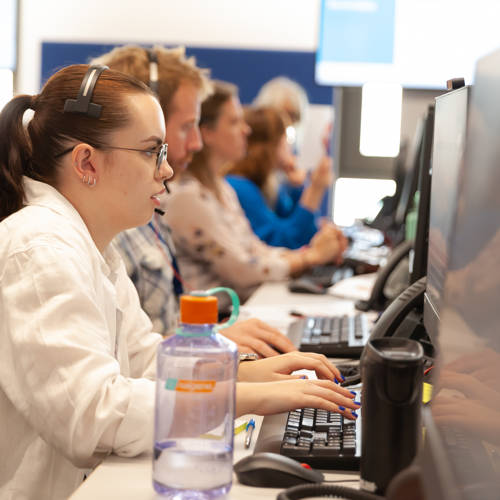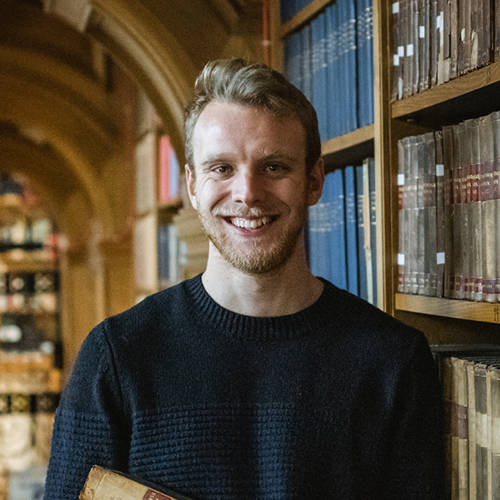Overview
Explore how language shapes communication, identity, and society with a Master's in Applied Linguistics. This MA offers an exciting opportunity to explore how language naturally functions and how it influences how we communicate with each other.
This postgraduate degree will equip you with the advanced skills and knowledge needed to analyse and apply language effectively across diverse contexts, giving you the professional skillset and confidence to succeed upon graduation.
What you’ll learn
- Analyse how language operates across social, educational, and professional contexts.
- Apply linguistic theory to real-world communication and cultural understanding.
- Learn from expert academics through research-informed teaching and collaborative opportunities.
- Develop advanced linguistic research and critical thinking skills through practical projects.
- Explore how language underpins all aspects of our lives, from education and healthcare to politics and law.
You'll engage with real-life language use and communication, developing expertise in areas such as language acquisition, sociolinguistics, intercultural communication, and discourse analysis.
The course blends theory with practical application, allowing you to connect linguistic research with real-world challenges and innovations, including the relationship between linguistics, generative AI, and sustainability.
What's more, our interdisciplinary challenge module encourages collaboration with students from other disciplines, helping you build broader professional awareness and address global issues through language.
This MA Applied Linguistics is more than just a course - it’s a chance to contribute meaningfully to the ways we understand and use language in the modern world.
The MA Applied Linguistics will increase your confidence as a communicator and raise your awareness of how language shapes societies and professional practices. It will give you the skills and tools to analyse language use and exploit the full potentials of language and communication in a variety of professional contexts; media, advertising, education, translation, healthcare and the law being some examples.Course Director
Why study at CCCU?
Entry requirements
A good undergraduate degree (2:2 or above) and two supporting academic/professional references. If English is not the first language an IELTS overall score of 6.0 is required, with no element below 5.5.
We recognise that some applicants may not meet these standard requirements, yet may be desirable candidates with other and appropriate skills and knowledge. In this case they may be offered the opportunity to complete an orientation module or a portfolio to demonstrate their ability to work at level 7. Applicants may be asked to attend an interview.
The University accepts non-UK qualifications equivalent to those outlined above and confirmed through NARIC. For IELTS and other English Language requirements, please visit our dedicated IELTS web page.
Module information
As well as the core modules, you may also have the opportunity to study a number of option modules. Option modules will not be pre-selected for you. We provide examples of option modules. The availability of specific option modules may vary from year to year. The offer of an option will be subject to a minimum number of students choosing the module to ensure the appropriate student experience. The offer of option modules may also be affected by staff availability. It means we cannot guarantee the availability of a particular optional module. However, we will ensure you have a choice of option modules.
Core/optional modules
How you’ll learn
The programme uses lectures, seminars, a virtual learning environment, group work, practical work, individual and small-group tutorials and guided independent study. These are designed to develop students’ knowledge and understanding of subject-specific skills and important ideas in applied linguistics, and to develop cognitive and practical skills by applying this understanding to specific professional contexts.
Working with others and sharing experiences and perspectives with fellow students will deepen and refine your understanding of, and ability to assess and to explore the theories and ideas you encounter on the course. Through participation in discussion, both face-to-face and online, you will both refine your own understanding and develop communication and listening skills for effective collaboration relevant to professional life.
We also make use of a flipped classroom approach, whereby core learning is placed outside of class time to provide more time in class for critical discussion and practical group activities. A flipped approach provides you with opportunities to study module content at your own pace; develops and extends students’ independent learning and builds confidence for full engagement and participation in classroom discussion and activities.
Being required to produce regular assignments and presentations contributes significantly to your conscious organisation of material, encouraging connections between different theoretical and practical sides in the course content, making it more relevant to you. In this, we agree with Vygotsky that ‘Thought does not express itself in words, but rather realizes itself in them’.
How you’ll be assessed
Throughout the course your knowledge and skills will be informally assessed through a variety of learning activities. You will be encouraged to engage in self-assessment and may be actively involved in peer assessment.
Formally, the course is assessed solely through coursework, including portfolio work, reports, essays and presentations.
In the final trimester, with the support and guidance of an individual supervisor, you will write a 15,000-word dissertation on a topic of your choice in the field of Applied Linguistics.
There is no final exam.
Your future career
Graduates of this course will be able to pursue careers in a variety of industries, including advertising, media, publishing, education, translation and language consultancy for a variety of professional fields. Others may use this as a way to start their own business.
Students completing this MA might also go on to undertake a PhD in Applied Linguistics or a teaching qualification to take their practice into a school, FE or HE setting.
Fees
Government loans are available for some postgraduate Master’s courses. Loans are subject to both personal and course eligibility criteria.
The rules around course eligibility mean that in some cases it may depend on how you are studying (full-time or part-time) as to whether you can apply for a postgraduate loan. To check whether your course is eligible, you can email the Student Fees Team or call 01227 923 456.
Tuition Fees for 2026/27 have not yet been finalised. These course web pages will be updated with Tuition Fee information once they have been agreed.
- Read advice about funding your degree
- See information about the financial support available for postgraduate studies
- If you would like information about paying your fees, please contact accounts.receivable@canterbury.ac.uk
- For specific fee queries, please contact fees@canterbury.ac.uk
Apply now
Duration:
1 yearLocation(s):
Canterbury


